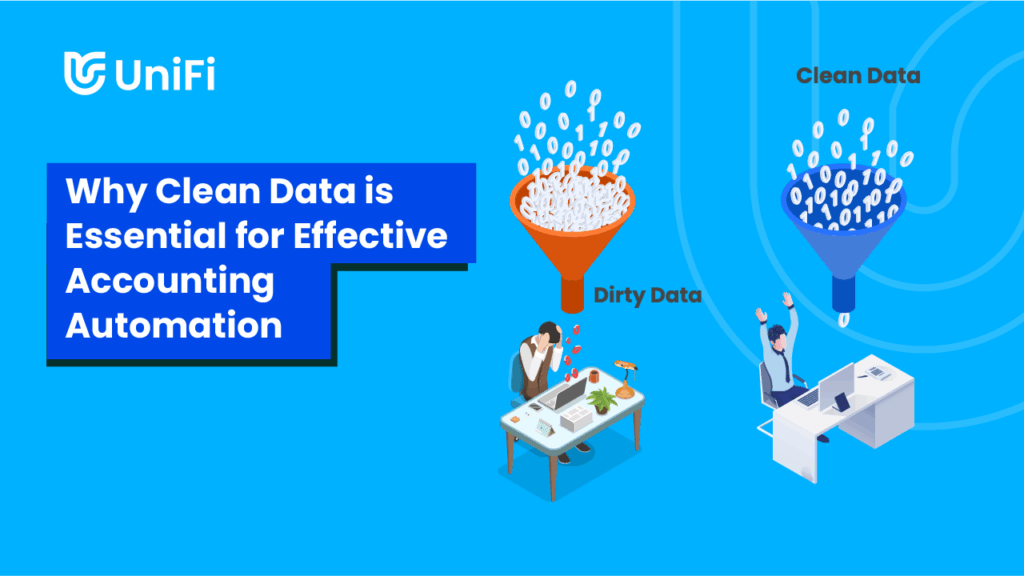As businesses strive to streamline their operations and increase efficiency, accounting automation has emerged as a powerful tool.
Automated accounting systems can handle a wide range of tasks, from invoicing and payroll to financial reporting and budgeting.
However, the success of these systems is heavily dependent on the quality of the underlying data.
Clean, accurate, and well-structured data is the foundation for effective accounting automation.
When data is messy, incomplete, or inconsistent, the automation process can break down, leading to errors, inefficiencies, and potentially serious financial consequences.
Here are some of the key reasons why clean data is essential for effective accounting automation:
The Foundation of Accuracy
Clean data serves as the foundation for accuracy in accounting automation. Automated systems rely on algorithms to process and analyse data, generating reports, forecasts, and insights. If the input data is flawed, the outputs will be equally flawed.
For example, duplicate entries, incorrect categorisation, or outdated information can lead to inaccurate financial statements, misinformed business decisions, and potential compliance issues.
Ensuring data accuracy from the outset helps maintain the integrity of your financial processes and boosts confidence in the automation system’s outputs.
Enhanced Efficiency and Productivity
One of the primary advantages of accounting automation is increased efficiency. However, this efficiency can be compromised if the data being processed is not clean.
Inaccurate and incomplete data can cause automation systems to flag errors, slow down processing times, and require manual intervention to correct issues.
This defeats the purpose of automation, as the time saved through automation is lost to data cleanup.
Clean data, on the other hand, allows automation systems to run smoothly and efficiently, enabling your accounting team to focus on more strategic tasks rather than constantly fixing data issues.
Improved Compliance and Risk Management
Accounting departments must adhere to strict regulatory requirements and standards.
Clean data is crucial for ensuring compliance with these regulations. Automation systems that process clean data are better equipped to generate accurate reports, maintain audit trails, and ensure that all financial activities are documented correctly.
This reduces the risk of non-compliance, which can result in fines, penalties, and damage to your organisation’s reputation.
Additionally, clean data enhances risk management by providing a clear and accurate picture of your financial standing.
Automation systems can quickly identify anomalies, trends, and potential risks when they are working with clean data. This allows for proactive decision-making and the ability to address issues before they escalate.
Facilitating Seamless Integration
Many organisations utilise multiple systems for different aspects of their financial operations, such as ERP systems, payroll software, and CRM tools.
Clean data is essential for seamless integration between these systems. When data is standardised and free from errors, it can be easily shared and synced across platforms, ensuring that all systems are working with the same accurate information.
This integration is key to realising the full potential of accounting automation, as it enables a unified view of financial data across the organisation.
Building Trust in Automation
For many accounting professionals, trusting automation systems can be a challenge, especially if they have encountered errors or inconsistencies in the past.
Clean data helps build trust in these systems by demonstrating that they can deliver reliable and accurate results. When accounting teams see that automation consistently produces correct outputs, they are more likely to embrace the technology and leverage it to its full potential.
Conclusion
Clean data is not just a technical requirement; it is a strategic asset that underpins the success of accounting automation.
By ensuring that your data is accurate, consistent, and up-to-date, you can unlock the full benefits of automation, from enhanced efficiency and productivity to improved compliance and risk management.
Investing in data quality is an investment in the future of your accounting processes, enabling your organisation to thrive in the era of automation.
Contact us today to learn more and schedule a demo.


